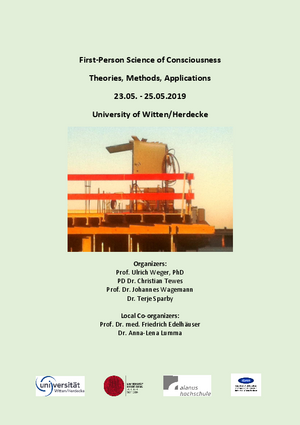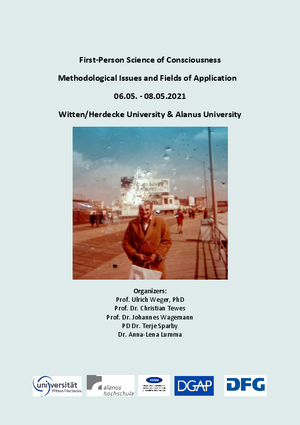Conference 2019

First-Person Science of Consciousness: Theories, Methods, Applications - 23rd - 25th May 2019 at Witten/Herdecke University, Germany
The idea of directing attention toward one's own mental acts and their contents exemplifies the ancient philosophical principal of "know thyself" in the context of our modern time. For philosophers like Brentano or Husserl, the observation of often unnoticed pre-reflexive mental phenomena opened up a field for investigating the structure and dynamics of the mind "from within". Corresponding theories and methods were suggested to provide a direct access to the most fundamental aspects of reality – the self, the structure of consciousness, the basic categories of reality, and their logical and ontological foundations.
The various attempts in the early 1900s at establishing a systematic form of introspection in psychology – for instance, in the work of Wundt and Titchener – are regarded as having failed. And though the work of Brentano and Husserl has been influential, actual introspective or phenomenological studies are rare today and typically met with skepticism. Similarly, methods such as phenomenological psychology and micro-phenomenology exist within a niche and are not yet widely regarded as reliable first-person approaches. Hence, a first-person science of consciousness is currently not part of the established forms of systematic, scientific procedure. This is striking, given the fact that first-person observation is implicitly involved in all forms of psychological research. Every psychologist makes direct or indirect use of introspection, for instance, when operationalizing psychological phenomena for further research. One can also argue that precise sense-based observation is inherently introspective, in that it involves mental faculties such as attention and memory.
Furthermore, we take for granted that science benefits from developing ever more precise instruments for investigating natural phenomena. Why should we not develop ever more precise methods for studying consciousness and the introspective activity that underlies scientific conduct? Until we have good methods for gathering accurate, reliable and rich descriptions of mental events and processes, psychology and related disciplines will arguably lack a strong foundation.
Conference 2021

First-Person Science of Consciousness - Methodological Issues and Fields of Application - 6th - 8th May 2021 at Witten/Herdecke University, Germany
With the recent re-appearance of consciousness as a field of research in the cognitive sciences, different methods of first-person enquiry have been developed. In the field of “micro-phenomenology”, for example, various techniques are now available to invoke first-person experiences and to analyze their structural content. The same is true with regard to the “descriptive experience sampling method”, the psychotherapeutic method of “focusing”, or the “protocol analysis” approach – to name only a few. Each of these methods explores subjects’ lived experiences. This does not mean, however, that there are no controversies concerning the structure and justification of the respective methods. A number of important issues remain unresolved. For instance, should a first-person science seek to inquire into pre-reflective or “pristine experiences” of mental processes? Are reflexivity and the application of concepts essential ingredients of first-person descriptions? How do we assess the process of retrospection, i.e. the temporal gap between a former experience and its re-evocation? Finally, in what way do first-person methods have to adapt to specific disciplines as diverse as psychology, psychotherapy, mathematics, or pedagogy?

